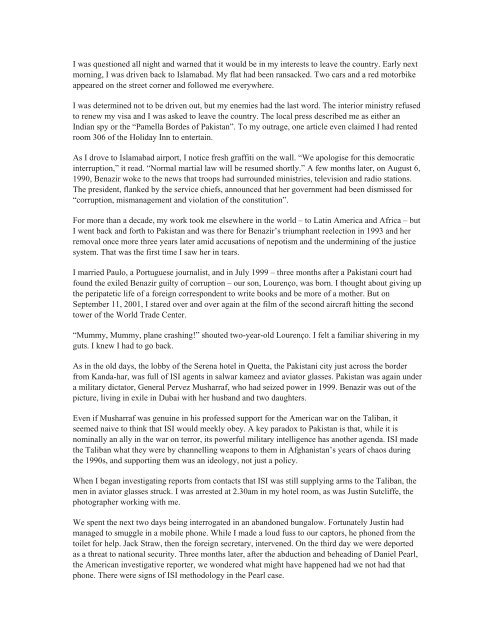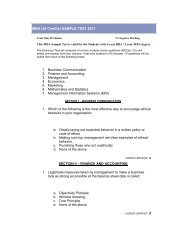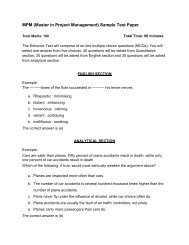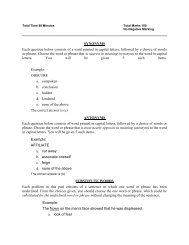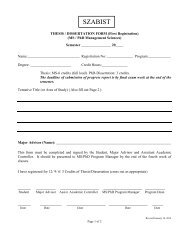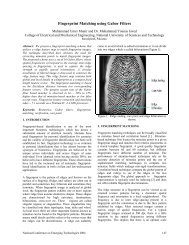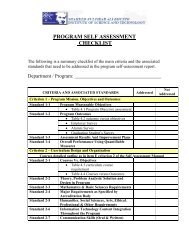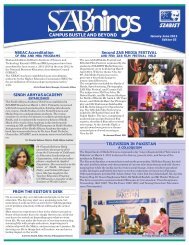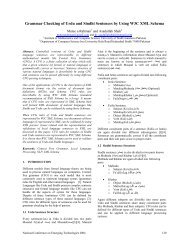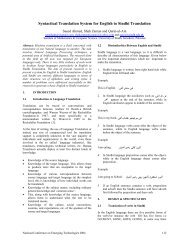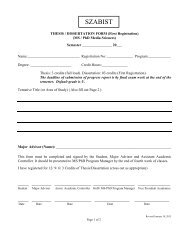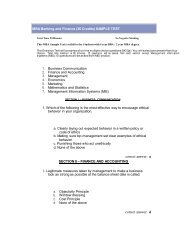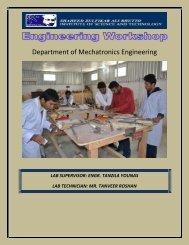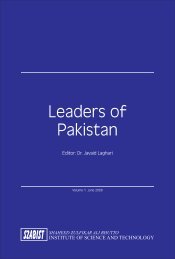Benazir Bhutto - SZABIST
Benazir Bhutto - SZABIST
Benazir Bhutto - SZABIST
Create successful ePaper yourself
Turn your PDF publications into a flip-book with our unique Google optimized e-Paper software.
I was questioned all night and warned that it would be in my interests to leave the country. Early next<br />
morning, I was driven back to Islamabad. My flat had been ransacked. Two cars and a red motorbike<br />
appeared on the street corner and followed me everywhere.<br />
I was determined not to be driven out, but my enemies had the last word. The interior ministry refused<br />
to renew my visa and I was asked to leave the country. The local press described me as either an<br />
Indian spy or the “Pamella Bordes of Pakistan”. To my outrage, one article even claimed I had rented<br />
room 306 of the Holiday Inn to entertain.<br />
As I drove to Islamabad airport, I notice fresh graffiti on the wall. “We apologise for this democratic<br />
interruption,” it read. “Normal martial law will be resumed shortly.” A few months later, on August 6,<br />
1990, <strong>Benazir</strong> woke to the news that troops had surrounded ministries, television and radio stations.<br />
The president, flanked by the service chiefs, announced that her government had been dismissed for<br />
“corruption, mismanagement and violation of the constitution”.<br />
For more than a decade, my work took me elsewhere in the world – to Latin America and Africa – but<br />
I went back and forth to Pakistan and was there for <strong>Benazir</strong>’s triumphant reelection in 1993 and her<br />
removal once more three years later amid accusations of nepotism and the undermining of the justice<br />
system. That was the first time I saw her in tears.<br />
I married Paulo, a Portuguese journalist, and in July 1999 – three months after a Pakistani court had<br />
found the exiled <strong>Benazir</strong> guilty of corruption – our son, Lourenço, was born. I thought about giving up<br />
the peripatetic life of a foreign correspondent to write books and be more of a mother. But on<br />
September 11, 2001, I stared over and over again at the film of the second aircraft hitting the second<br />
tower of the World Trade Center.<br />
“Mummy, Mummy, plane crashing!” shouted two-year-old Lourenço. I felt a familiar shivering in my<br />
guts. I knew I had to go back.<br />
As in the old days, the lobby of the Serena hotel in Quetta, the Pakistani city just across the border<br />
from Kanda-har, was full of ISI agents in salwar kameez and aviator glasses. Pakistan was again under<br />
a military dictator, General Pervez Musharraf, who had seized power in 1999. <strong>Benazir</strong> was out of the<br />
picture, living in exile in Dubai with her husband and two daughters.<br />
Even if Musharraf was genuine in his professed support for the American war on the Taliban, it<br />
seemed naive to think that ISI would meekly obey. A key paradox to Pakistan is that, while it is<br />
nominally an ally in the war on terror, its powerful military intelligence has another agenda. ISI made<br />
the Taliban what they were by channelling weapons to them in Afghanistan’s years of chaos during<br />
the 1990s, and supporting them was an ideology, not just a policy.<br />
When I began investigating reports from contacts that ISI was still supplying arms to the Taliban, the<br />
men in aviator glasses struck. I was arrested at 2.30am in my hotel room, as was Justin Sutcliffe, the<br />
photographer working with me.<br />
We spent the next two days being interrogated in an abandoned bungalow. Fortunately Justin had<br />
managed to smuggle in a mobile phone. While I made a loud fuss to our captors, he phoned from the<br />
toilet for help. Jack Straw, then the foreign secretary, intervened. On the third day we were deported<br />
as a threat to national security. Three months later, after the abduction and beheading of Daniel Pearl,<br />
the American investigative reporter, we wondered what might have happened had we not had that<br />
phone. There were signs of ISI methodology in the Pearl case.


